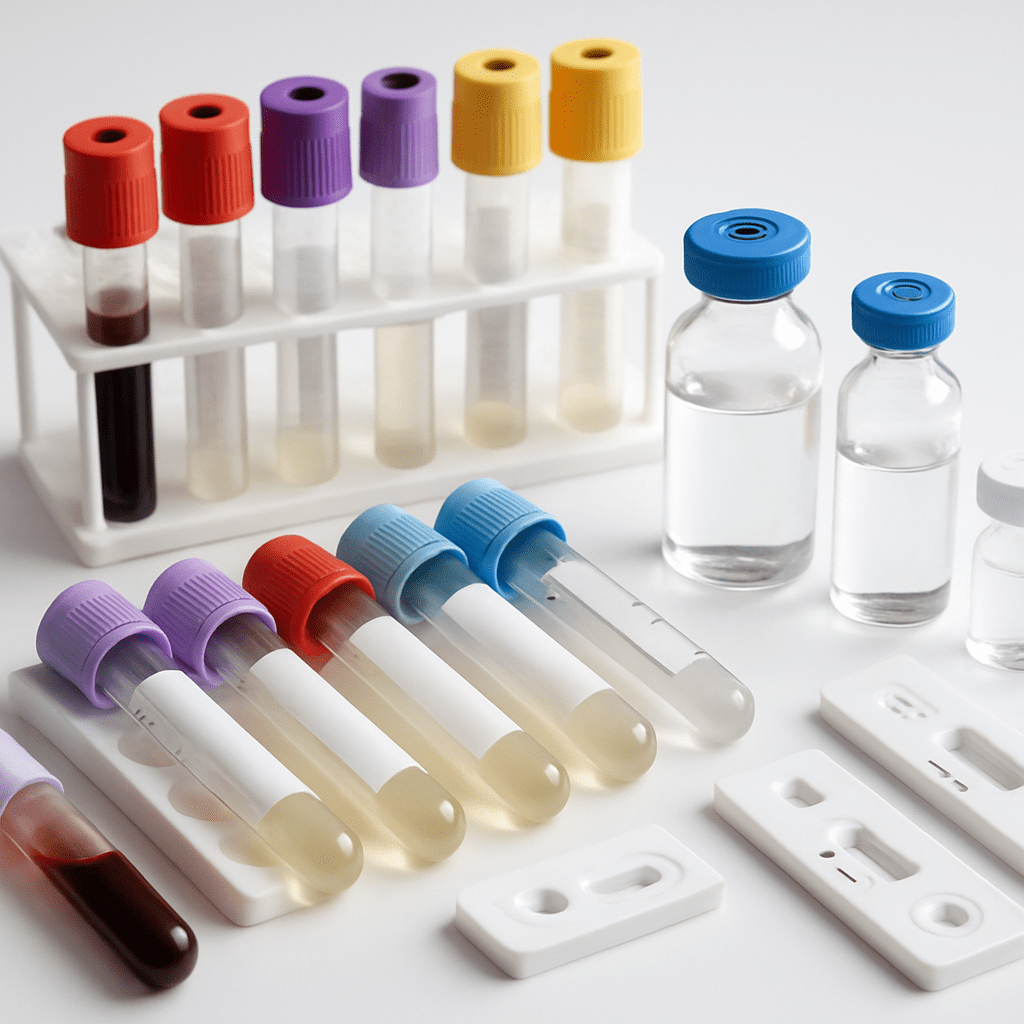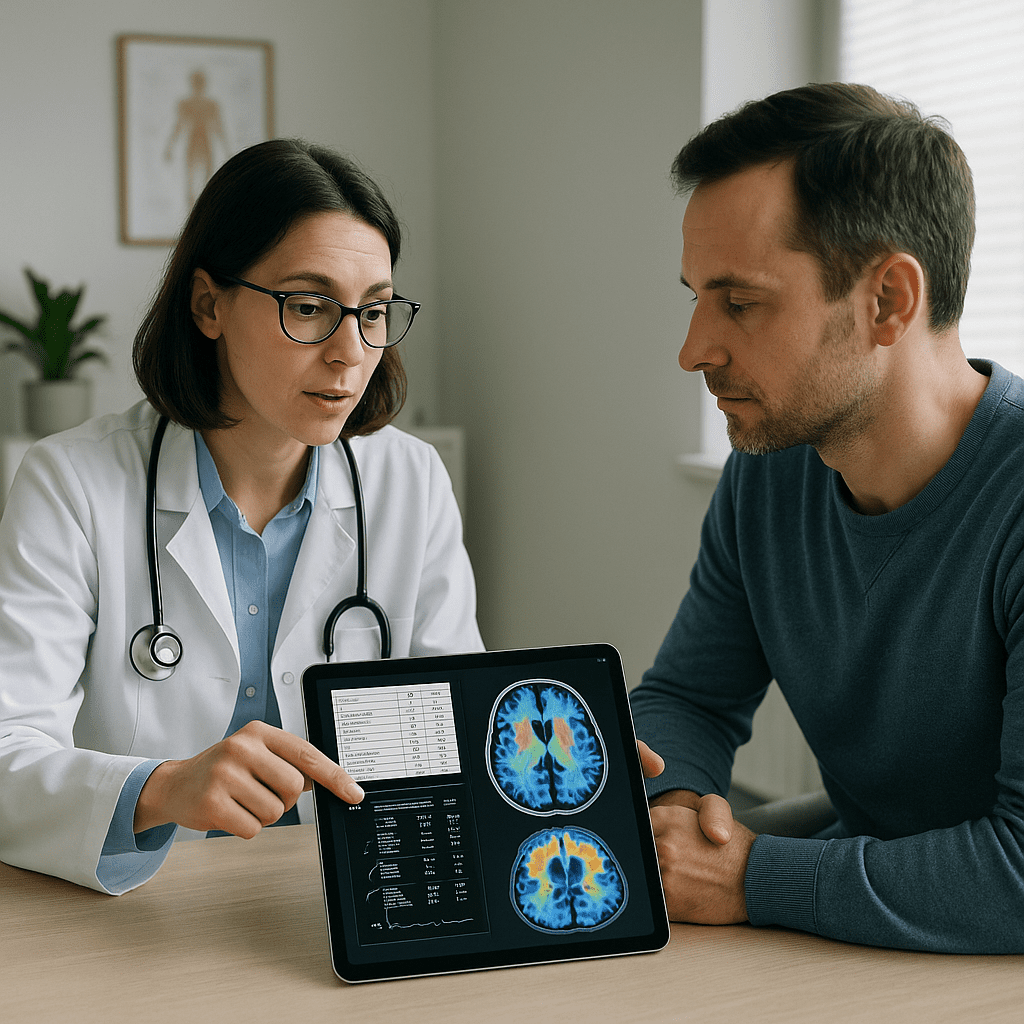In the landscape of aging and cognitive decline, few conditions spark as much concern and urgency as dementia. For patients, caregivers, and clinicians alike, one of the most pressing challenges is identifying the root causes of memory loss before irreversible damage is done. The clinical approach to evaluating cognitive impairment has evolved significantly over the years, with an increasing emphasis on evidence-based diagnostics. Central to this evolving paradigm is the dementia workup—a comprehensive set of evaluations designed to differentiate between types of cognitive disorders and to identify potentially reversible causes. Among the most critical tools within this framework are lab tests for dementia. These tests not only serve as a window into the biochemical and metabolic status of a patient but also offer vital clues that can guide treatment planning and improve patient outcomes.
While many view dementia as an inevitable consequence of aging, the truth is more nuanced. The term “dementia” refers to a cluster of symptoms resulting from various underlying conditions, some of which may be treatable or at least modifiable if caught early. This underscores the importance of timely and accurate diagnostic procedures. Dementia labs, as part of a broader diagnostic strategy, can detect imbalances or deficiencies that may mimic or contribute to cognitive decline. Understanding what these lab tests for dementia entail, why they are ordered, and how they inform the overall diagnostic picture is crucial for anyone involved in the care or assessment of individuals with memory loss.
You may also like: How to Prevent Dementia and Alzheimer’s Disease Naturally: Expert-Backed Strategies to Reduce Your Risk Through Lifestyle and Diet

The Role of Laboratory Testing in the Dementia Diagnostic Process
When cognitive impairment presents in a clinical setting, a systematic approach is essential. The initial phase typically involves a detailed patient history, cognitive assessments, and physical examination. However, this groundwork must be complemented by targeted laboratory investigations to uncover potentially treatable causes of memory loss. Dementia workups commonly include a panel of lab tests to evaluate for metabolic, nutritional, infectious, and endocrine abnormalities. These tests provide critical baseline data, help exclude confounding variables, and support differential diagnosis.
Laboratory testing plays a pivotal role in distinguishing between primary neurodegenerative diseases like Alzheimer’s disease and secondary, reversible causes of cognitive impairment. For example, conditions such as hypothyroidism, vitamin B12 deficiency, or chronic infections may manifest with symptoms that closely resemble those of dementia. Labs for memory loss can often uncover these hidden contributors, allowing clinicians to intervene before cognitive damage becomes permanent. Moreover, these tests are typically low-cost, widely available, and minimally invasive, making them an essential first step in a thorough dementia evaluation.
In many cases, laboratory findings may also reveal comorbidities that complicate the clinical picture, such as renal insufficiency or hepatic dysfunction, both of which can impact cognitive function. By systematically assessing these physiological parameters, healthcare providers can make informed decisions about further testing, specialist referrals, and treatment strategies. The integration of dementia labs into routine cognitive assessments not only enhances diagnostic accuracy but also aligns with evidence-based best practices in geriatric medicine.

Core Lab Tests in the Standard Dementia Workup
The typical battery of lab tests included in a dementia workup is designed to assess common reversible contributors to cognitive decline. One of the most universally ordered tests is the complete blood count (CBC), which evaluates red and white blood cells, hemoglobin levels, and markers of infection or anemia. Anemia, particularly if chronic or severe, can impair oxygen delivery to the brain, leading to fatigue, confusion, and memory problems. Similarly, a basic metabolic panel (BMP) or comprehensive metabolic panel (CMP) provides insight into electrolyte balance, kidney and liver function, and glucose levels—all of which are critical to brain health.
Another cornerstone of dementia lab testing is thyroid function evaluation. Hypothyroidism is a well-known, reversible cause of cognitive slowing and memory deficits. A thyroid-stimulating hormone (TSH) test, often paired with free thyroxine (T4), helps identify underactive thyroid conditions that may be contributing to cognitive symptoms. In patients with subtle or borderline results, additional testing for thyroid antibodies may be warranted to assess for autoimmune thyroiditis, a common cause of hypothyroidism in older adults.
Vitamin B12 and folate levels are also frequently assessed during dementia workups. Deficiencies in these essential nutrients are associated with neuropsychiatric manifestations, including cognitive impairment, mood changes, and peripheral neuropathy. Because B12 deficiency can mimic early dementia, prompt identification and treatment can lead to significant improvement or even resolution of symptoms. Some clinicians may also evaluate homocysteine levels, an amino acid that tends to rise with B12 or folate deficiency and may be associated with increased risk of neurodegeneration.

Additional Diagnostic Insights from Specialized Dementia Labs
Beyond the core lab tests, specialized assessments may be ordered based on individual risk factors, symptoms, or clinical suspicion. One such test is the erythrocyte sedimentation rate (ESR) or C-reactive protein (CRP), which can indicate systemic inflammation. Chronic inflammation has been implicated in the pathogenesis of many neurodegenerative diseases and may also point toward infectious or autoimmune etiologies. While not diagnostic on their own, inflammatory markers provide context and may prompt further investigation.
In certain clinical scenarios, serologic testing for infections such as syphilis or HIV may be included in the dementia workup. Though rare, these infections can have significant neurological sequelae if left untreated. Inclusion of these tests often depends on the patient’s history, risk factors, or unexplained progression of symptoms. Testing for heavy metal toxicity—such as lead, arsenic, or mercury—may be considered in patients with relevant occupational or environmental exposure.
Hormonal panels, including cortisol and testosterone levels, may offer additional insight in select patients. For instance, cortisol abnormalities related to chronic stress or adrenal dysfunction can contribute to mood disorders and cognitive impairment. In older men, low testosterone has been linked to cognitive decline, and its measurement may inform treatment discussions. These tests, while more specialized, contribute to a holistic view of brain health and reinforce the importance of individualized assessment.
Autoimmune panels, including antinuclear antibodies (ANA) and antineutrophil cytoplasmic antibodies (ANCA), may be appropriate in patients with systemic symptoms, rapid progression, or atypical presentations. Although rare, autoimmune encephalopathies can mimic dementia and respond well to immunosuppressive treatment. Inclusion of such tests highlights the expanding role of laboratory diagnostics in uncovering less obvious but treatable contributors to memory loss.
The Significance of Comprehensive Metabolic Screening in Cognitive Disorders
The brain is highly sensitive to changes in metabolic status. Even minor imbalances in glucose, sodium, calcium, or liver enzymes can have profound effects on cognition, mood, and behavior. Comprehensive metabolic screening, therefore, occupies a central position in dementia labs. In particular, abnormal glucose regulation—as seen in diabetes or insulin resistance—has been consistently linked to increased risk of cognitive impairment and Alzheimer’s disease.
Hyponatremia, or low sodium levels, is another common metabolic disturbance that can lead to confusion, lethargy, and cognitive dysfunction. Similarly, hypercalcemia may present with subtle neurological signs, including memory issues, irritability, or depression. Liver dysfunction, as reflected by elevated transaminases or ammonia levels, can lead to hepatic encephalopathy—a condition characterized by fluctuating cognition, sleep disturbances, and even coma in severe cases. Detecting these abnormalities early can dramatically alter the clinical course by prompting timely intervention.
Renal insufficiency, which is also detectable through metabolic panels, affects the clearance of metabolic waste products and can result in a condition known as uremic encephalopathy. Symptoms may include cognitive slowing, difficulty concentrating, and changes in mental status. By incorporating these evaluations into a dementia workup, clinicians are better equipped to identify modifiable factors and reduce diagnostic uncertainty. Moreover, consistent use of comprehensive metabolic screening aligns with clinical guidelines and promotes high standards of care.

Integrating Lab Results into a Multimodal Diagnostic Framework
Lab tests alone rarely provide a definitive diagnosis of dementia. Instead, they function as essential components of a broader diagnostic strategy that includes neuroimaging, cognitive testing, and functional assessments. When interpreted in conjunction with clinical history and physical findings, dementia labs offer critical context and help refine the differential diagnosis. This integrative approach is particularly valuable when distinguishing between Alzheimer’s disease, vascular dementia, frontotemporal dementia, and other less common etiologies.
The use of lab results to track disease progression or treatment response is an emerging area of interest. For instance, in patients with B12 deficiency-related cognitive decline, serial monitoring of B12 levels can confirm treatment efficacy and guide maintenance therapy. Similarly, thyroid function tests can help evaluate the effectiveness of hormone replacement in hypothyroid patients with memory loss. The ability to use lab data not just diagnostically but also for longitudinal management is a significant advantage.
Moreover, integrating laboratory data into electronic health records and clinical decision support tools enhances interdisciplinary communication and facilitates coordinated care. Geriatricians, neurologists, primary care providers, and psychiatrists can all benefit from a shared understanding of lab-based insights. In this way, dementia labs contribute not only to initial diagnosis but also to ongoing care planning and outcome monitoring. As the healthcare system moves toward more personalized and value-based models of care, such integration becomes increasingly essential.
Addressing Challenges and Limitations in Dementia Lab Testing
Despite their utility, dementia labs are not without limitations. One common challenge is the interpretation of borderline or ambiguous results, which may create uncertainty for both clinicians and patients. For example, subclinical hypothyroidism or marginal B12 deficiency may not clearly explain the extent of cognitive symptoms, yet still warrant close monitoring or trial treatment. In these situations, clinical judgment becomes paramount, and laboratory findings must be interpreted in context rather than in isolation.
Another concern is the potential for over-testing, which may lead to unnecessary anxiety, false positives, or incidental findings that distract from the primary diagnostic goal. Balancing thoroughness with judicious use of resources is key. Clinicians must tailor lab panels to the individual’s history, symptoms, and risk factors, rather than relying on standardized test batteries alone. Additionally, disparities in healthcare access may limit the availability of certain tests in under-resourced settings, highlighting the need for equitable diagnostic strategies.
There is also an ongoing need for research into new biomarkers that may improve the specificity and sensitivity of dementia diagnostics. Advances in proteomics, genomics, and metabolomics hold promise for future lab-based tools that can detect early-stage disease or differentiate among dementia subtypes with greater accuracy. Until such innovations are fully validated and integrated into clinical practice, the current suite of dementia workup tests remains indispensable. Recognizing both their strengths and their limitations is essential for responsible and effective use.
Frequently Asked Questions: Understanding Dementia Workup and Lab Testing for Memory Loss
1. How do dementia labs contribute to differentiating between Alzheimer’s and other types of dementia?
Dementia labs can help clarify whether symptoms arise from Alzheimer’s disease, another type of dementia, or a reversible condition that mimics cognitive decline. For example, certain metabolic or vitamin deficiencies can mirror the cognitive symptoms seen in early Alzheimer’s. A comprehensive dementia workup that includes targeted lab tests for dementia allows clinicians to exclude these alternatives. In cases where memory loss is accompanied by abnormal thyroid or B12 levels, the cause may be reversible with treatment. These labs for memory loss add specificity to the diagnostic process, helping clinicians to avoid premature or inaccurate diagnoses.
2. Can labs for memory loss reveal early signs of neurodegeneration before symptoms become obvious?
Yes, while dementia labs do not directly detect neurodegeneration, they can highlight biochemical imbalances that often precede cognitive symptoms. For example, subtle deficiencies in folate or B12 can impair neurochemical pathways essential for memory and concentration. Elevated homocysteine levels, which can be detected through labs for memory loss, may also suggest an increased risk of vascular-related cognitive decline. A well-structured dementia workup, informed by these early signals, allows for preventive interventions. While not diagnostic on their own, these lab results can serve as red flags that prompt more detailed neurological investigations.
3. What role do dementia labs play in guiding personalized treatment plans?
One of the most underappreciated values of lab tests for dementia is their ability to guide individualized care strategies. For example, if a dementia workup reveals a significant vitamin D or testosterone deficiency, targeted supplementation may improve cognitive performance or stabilize mood. Additionally, patients with insulin resistance identified through glucose testing may benefit from dietary adjustments tailored to glycemic control, which is increasingly linked to brain health. Dementia labs help build a biochemical profile that reflects the patient’s unique vulnerabilities and informs customized interventions. This approach aligns with the growing emphasis on precision medicine in cognitive healthcare.
4. Are there any emerging biomarkers being considered for future dementia labs?
The field of neurodiagnostics is rapidly evolving, and researchers are investigating a range of new biomarkers for inclusion in future lab tests for dementia. For instance, neurofilament light chain (NfL), a protein released during axonal damage, is being studied as a blood-based marker for neurodegeneration. Plasma amyloid-beta ratios and tau proteins, once only measurable through cerebrospinal fluid analysis, are also being explored for their viability in standard blood panels. While these aren’t yet part of routine dementia labs, they represent a frontier that may redefine how we conduct a dementia workup. These innovations hold the promise of earlier detection and more accurate disease subtyping.
5. How frequently should lab tests for dementia be repeated once cognitive symptoms begin?
The frequency of repeating dementia labs depends on the patient’s initial results, underlying conditions, and symptom trajectory. If labs for memory loss reveal correctable factors like vitamin deficiencies or thyroid imbalances, follow-up testing may occur every 3 to 6 months to monitor treatment efficacy. In chronic conditions like diabetes or renal impairment, more frequent testing may be needed to track metabolic control. A dementia workup may also be reinitiated if symptoms worsen or change in character, suggesting a new or evolving pathology. Regular re-evaluation ensures that any new contributors to cognitive decline are promptly identified and addressed.
6. Can dementia workups help detect cognitive side effects of medications?
Yes, dementia workups often include labs that can identify drug-induced imbalances contributing to memory loss or confusion. For example, medications affecting sodium or calcium levels can disrupt neural signaling, leading to cognitive side effects. If a patient is taking anticholinergics, diuretics, or sedatives, dementia labs can reveal electrolyte shifts that may not otherwise be obvious. Identifying such pharmacologically induced changes allows clinicians to adjust or discontinue problematic medications. This is particularly important in older adults, where polypharmacy is common and drug interactions frequently mimic or exacerbate dementia symptoms.
7. Are there specific dementia labs that help assess inflammation’s role in cognitive decline?
Inflammation is increasingly recognized as a key player in neurodegeneration, and certain lab tests for dementia can offer insight into this dynamic. High-sensitivity C-reactive protein (hs-CRP) and erythrocyte sedimentation rate (ESR) are common markers used to assess systemic inflammation. When elevated, they may indicate chronic inflammatory states that contribute to cognitive impairment. While not diagnostic of any one condition, these tests are valuable additions to a comprehensive dementia workup, especially in patients with autoimmune histories. Understanding inflammation’s role through these labs for memory loss may support treatment strategies involving anti-inflammatory approaches or lifestyle modifications.
8. How do labs for memory loss intersect with psychiatric evaluations?
Cognitive decline can be driven by underlying psychiatric conditions such as depression or anxiety, which may coexist with or be mistaken for dementia. A dementia workup often includes labs that can identify hormonal or metabolic abnormalities contributing to mood disturbances. For example, hypothyroidism and B12 deficiency can present with both depressive symptoms and cognitive impairment. Dementia labs thus provide physiological context for psychiatric evaluations, ensuring that treatment plans account for both mental health and physical health contributors. In this way, lab tests for dementia serve as a bridge between neurology and psychiatry in diagnostic decision-making.
9. What are the implications of normal lab results in a dementia workup?
Receiving normal results from dementia labs can be both reassuring and challenging. On one hand, it helps rule out treatable causes of memory loss, narrowing the focus to neurodegenerative conditions or psychiatric issues. On the other hand, a normal dementia workup may necessitate more advanced imaging or referral to a neurologist for specialized testing. It’s important to understand that while normal lab tests for dementia eliminate certain possibilities, they do not rule out all cognitive disorders. Instead, they serve to refine the diagnostic path and prevent misdiagnosis due to overlapping symptoms.
10. Are there socio-cultural considerations in how dementia labs are interpreted or accessed?
Absolutely. Access to dementia labs can vary based on geographic location, healthcare infrastructure, and cultural beliefs about aging and memory loss. In some communities, symptoms may be normalized as a natural part of aging, delaying a proper dementia workup. Moreover, lab tests for dementia may be limited or interpreted differently based on cultural attitudes toward mental health and medical testing. Language barriers, stigma, and healthcare disparities can all affect whether and how labs for memory loss are pursued. Culturally sensitive approaches to diagnostic care are essential for ensuring equitable and accurate dementia evaluations across diverse populations.
Final Reflections: Why Dementia Labs Matter in Protecting Brain Health
In an era marked by rising rates of cognitive decline and neurodegenerative disease, the value of timely and accurate diagnosis cannot be overstated. Dementia labs, when thoughtfully integrated into a comprehensive dementia workup, serve as a cornerstone of effective clinical evaluation. These tests provide essential insights into potentially reversible causes of memory loss, helping to distinguish treatable conditions from progressive disorders. As such, they play a critical role not only in shaping the diagnostic process but also in guiding long-term management strategies.
Lab tests for dementia do more than reveal numbers on a page; they offer a biochemical narrative of brain health that can inform everything from medication choices to dietary interventions. For clinicians, understanding how to interpret and act on these results is a vital skill, one that enhances diagnostic precision and patient care. For patients and caregivers, access to clear, evidence-based information about these tests can provide reassurance and foster informed decision-making.
While no single test can capture the complexity of cognitive decline, the collective power of labs for memory loss lies in their ability to paint a more complete picture. From thyroid function to vitamin status, from inflammation to metabolic health, each result contributes a vital piece to the diagnostic puzzle. As the science of dementia continues to evolve, so too will the tools we use to uncover its causes and craft effective interventions. In the meantime, the judicious use of dementia workup labs remains one of the most accessible and impactful ways to protect and preserve brain health in the face of growing cognitive challenges.
Further Reading:
What Is Dementia? Symptoms, Types, and Diagnosis


